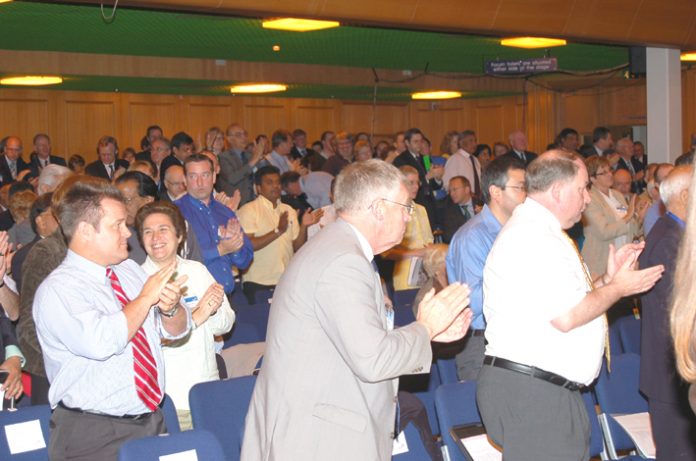
The BMA leadership was defeated yesterday when the association’s Annual Representative Meeting overwhelmingly carried Motion 65 against the purchaser-provider split in the NHS.
This split is central to the BMA’s Green Paper report ‘A rational way forward for the NHS in England’, and vital for the establishment of a health market.
The motion calls for the split to be ‘abandoned in England as it has been in Scotland’.
Mover Robin Arnold, of Bristol, said: ‘The purchaser-provider split puts costs up and secondary services are destabilised.’
He warned: ‘Markets don’t work in health. The purchaser-provider split is marketisation.’
Speaking against the motion, for the BMA Council, John Chisholm claimed it wasn’t the purchaser-provider split that led to waste, but bad Trust management.
In his reply, Robin Arnold warned that ‘competitive commissioning means the break-up of the NHS’.
Conference also overwhelmingly passed Motion 36: Reconfiguration.
This was moved by the Agenda Committee and supports the ‘provision of fully-functioning, comprehensive, acute district general hospitals, with properly supported A&E services.’
It demands ‘that the BMA vigorously oppose money-saving schemes to close A&E departments or reduce their acute services back-up’ and it insists the BMA adopt a policy of opposition to reconfigurations.’
The Executive accepted the motion with the amendment that it would oppose ‘reconfigurations that are not supported by doctors and patients’.
Dr David Wrigley, from Lancaster, moved the motion.
He said: ‘This motion relates to what is happening at my hospital, the Westmoreland.
‘They had a review of services when the PCT was £60 million in debt.
‘The review decided to close coronary care, close surgical admissions and buy into Netcare.’
He added: ‘God help you if you have a heart attack.
‘This is a money-saving measure, nothing to do with helping patients.’
Supporting the motion, Anna Athow, a consultant from Enfield and Haringey, said: ‘District general hospitals are essential, as are good A&Es.
‘The government’s Care in the Community is spin. They are not providing community hospitals, they’re talking about Private Treatment Centres and private polyclinics.
‘NHS boss David Nicholson wants to close 60 district general hospitals. This must be stopped. The way it is done is to close A&Es, close maternity units, so you’re left with a cold site, eventually leading to hospital closures.
‘Reconfiguration is about the destruction of district general hospitals.’
Speaking for the motion, medical student David Samuel said: ‘I wish to practice in my local district hospital. I come from Wales. My local hospital is threatened with closure.
‘People’s lives will be put at risk if we close our A&Es. After that we will lose maternity and other services.
‘Without acute services, people’s health will deteriorate. If we don’t support local hospitals, people will die.’
The meeting however also voted to accept the BMA Council’s proposal to ‘explore the idea of an independent Board of Governors responsible for the running of the NHS’.
Moving motion ‘NHS 4’, Dr Chaand Nagpaul, from Edgware and Hendon, said: ‘This vitally important policy proposes the NHS should be run day by day by an independent management board.’
Jonathan Fielden, chairman of the BMA consultants committee, had qualms about the clause in the motion which stated that the BMA Council ‘would be concerned if any NHS management board were appointed by and accountable to parliament.’
Fielden said the management board ‘must be accountable to parliament.’
The clause in the motion proposing a management board not accountable to parliament was voted on separately and thrown out unanimously by representatives.
Speaking against the motion, Dr Kailash Chand, from BMA’s GPs Council, warned: ‘The important question to ask is what an independent NHS board would actually do?
‘Would it help revive the NHS or would such a board accelerate the slow death of the NHS by opening wide the doors for private providers and sanction official rationing of services?
‘The board’s main task, presumably, would be to translate the government’s broad objectives into goals for the commissioners.
‘Ministers would appoint board members, set objectives and hold it to account.
‘Remember, this “independent’’ board of governors would be politically appointed by the government of the day.
‘What would stop them to appoint the Tesco, Boots, Sainsbury or private health companies’ chief executives to such a board?
‘This is a sure recipe in my view for lock, stock and barrel privatisation of the NHS.’